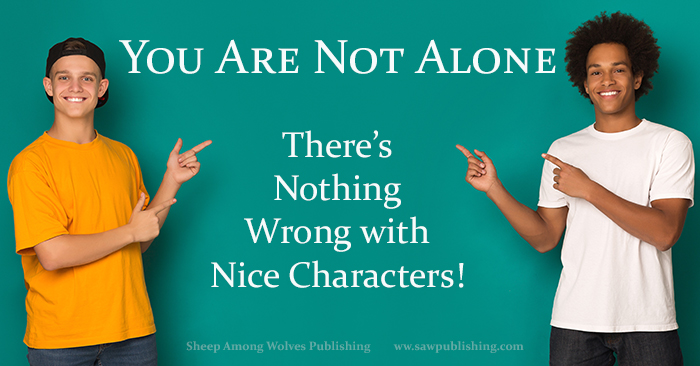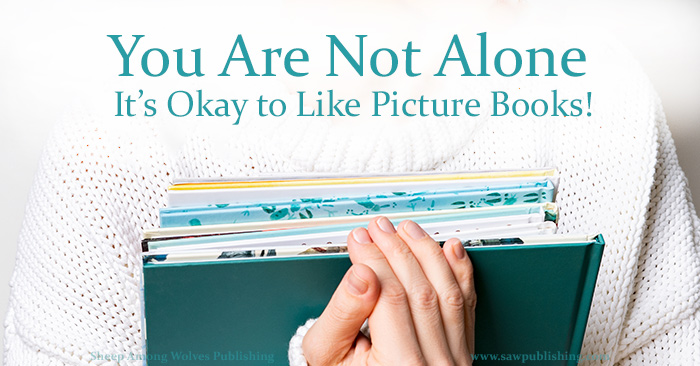You Are Not Alone: There’s Nothing Wrong with Nice Characters!
 I was recently reading a BBC article about a faith-based film that hit the mainstream market with unprecedented success. Interested by this unusual phenomenon, the journalist had done some digging to find out what people liked or did not like about the production.
I was recently reading a BBC article about a faith-based film that hit the mainstream market with unprecedented success. Interested by this unusual phenomenon, the journalist had done some digging to find out what people liked or did not like about the production.
One source they interviewed had only a single criticism about this unusually moral film. It was a fairly simple criticism, too:
The good guys were all good, and the bad guys were bad.
Ouch.
I’ve got nothing against the observation. It was the observation as a criticism that raised my eyebrows. The good guys were all good?
What’s Wrong with Being Good?
The short answer, of course, is nothing at all.
The world is suffering a lot more from bad characters than from good ones.
A cast of good heroes isn’t likely to tip us over the edge.
However, to be fair, the perspective the above-mentioned critic was writing from deserves a certain amount of respect. It is true that human beings are seldom all good, or all bad. The attempt to portray humanity in a way that reflects this mix of virtue and vice is in fact an insightful and potentially powerful breakthrough in the fiction/entertainment industries.
Although the word breakthrough, itself, may be a bit of a misnomer. The emergence of “morally grey” characters is not, in fact, a solely modern idea. It can be traced through most of the history of English-language fiction in one form or another and has seen periodic outbreaks of significant popularity over the past century and a half.
There can be no doubt, however, that it is enjoying a very substantial resurgence, particularly in mainstream writing and screenwriting today.
So why that little tug inside your heart? Why the voice that’s whispering that you still like “nice” characters—and you just wish other people liked them, too?
Do Good Guys Have to Be Good?
Not necessarily.
We see some powerful examples of flawed characters in Scripture, who were still used by God in incredible ways, and who bring us hope for ultimate redemption when we look at our own flawed and broken lives.
But possibly a fundamental difference here has to do with identity.

David, with all his failures, unquestionably saw himself as pledged to God’s service. Moses, in spite of his weaknesses, knew he was leading Israel in the direction of the pillar of cloud. The harlot Rahab, in the midst of a hopelessly corrupt culture, saw the Hand of God—and reached out towards it.
The characters whom Christianity has enshrined as the heroes of our faith are not individuals who attained to perfection. But they are characters who identified with perfection.
They failed.
But their standard did not.
And this is where I would like to argue that “good” characters—“nice” characters—characters who aren’t tangled up in unnecessary evil just for the sake of making them more relevant to the evil around them—do have a place in this world.
Nice Characters Are More than Okay!
We need moral absolutes in our lives.
On a very deep, subconscious level, there is something in our hearts that resonates with this truth.
We need to be reminded that God intended humanity to be good.
We need to be reminded that He has called us to be heroes—not villains.
We need to be reminded that He wants our perfection so much that He gave His own life to obtain it.
The criticism that a character is “too nice” can sometimes be a valid one. Some authors do struggle, at times, to write characters that embody realistic human experience. In general, this problem usually indicates a lack of general character development—the author is struggling to portray a unique individual and is therefore falling back on a “role player,” in this case a character who always “does the right thing” rather than a character who makes individual choices based on individual motivations.
But the danger of this sweeping criticism of nice characters is that it has a tendency to miss its mark and carry with it a Parthian shaft that suggests that niceness itself is possibly a failing.
Which and When?
So what’s the difference between characters with realistic faults that serve a story, and characters who are nasty just for the sake of proving their author is still in touch with the “real world?” (An expression I hate, by the way, but we don’t have time for that rant right now!)
I think perhaps the question itself provides an answer.
Useful character flaws serve the story. The character who fights evil inside of himself as well as outside—whether that evil is a massive, life-threatening addiction, or simply the temptation to tell a “white” lie or buy in to a thought pattern of negative self-worth—is serving the story.
The character who snubs his little brother, or ends his sentence with an oath, or engages in petty shoplifting that plays no meaningful role in the narrative, simply to demonstrate that the author doesn’t fall into the “too nice” trap, is not really serving the story. At least not in the majority of cases.
And this pseudo-sense of realism is contributing something very real and harmful to the culture at large. It’s contributing to the sense that nice characters are somehow wrong.
There’s Nothing Wrong with Nice Characters!
Really and truly, there isn’t!
Liking your heroes good and your villains bad isn’t a failing.
It’s a fundamental human instinct.
Yes, there may be times when a “morally grey” character has a role to play in a story. Certainly, there are times when a flawed character striving after good has a role to play in most stories.
But what I’m here to say this morning is that nice characters aren’t useless—or unrealistic—or somehow inferior to the rest of the world.
On the contrary, they are a meaningful reminder and reality-check. They are a confirmation of the basic principle that good is stronger than evil. That right is stronger than wrong. That we were created to triumph, not to fail.
Don’t be ashamed of liking “nice” characters!
There’s nothing wrong with you for it.
And you’re definitely not alone!
If you enjoyed this post, you might also like:
- The Homeschooler’s Library: 10 Books to Read Aloud Before Your Child is Six
- FREE Today: One Size Too Big

